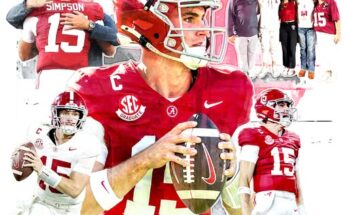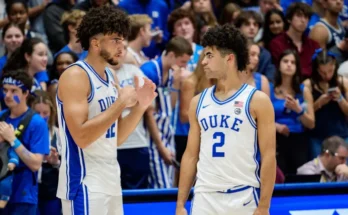When we think of Alabama’s dynasty under head coach Nick Saban, a few names come to mind as symbols of the team’s success: Derrick Henry, Tua Tagovailoa, Amari Cooper, and, of course, Julio Jones. The wide receiver position has played a pivotal role in shaping the identity of Saban’s Alabama teams, and among the many standout players in this position, Julio Jones remains one of the most generational talents to ever suit up for the Crimson Tide.
Jones’ impact on Alabama’s football program is immeasurable. As a physically gifted, versatile, and playmaking wide receiver, he set the stage for what has now become a tradition of elite wideouts coming through Tuscaloosa. Jones’ contributions not only helped Alabama win national championships but also transformed the way Saban and his staff viewed the passing game in the context of a team historically built on power running and elite defense. In honoring Julio Jones, we pay tribute not just to his individual brilliance but also to how he helped shape the Alabama dynasty under Nick Saban.
The Early Years and Arrival at Alabama
Julio Jones’ journey to the University of Alabama began long before he became the star we know today. Hailing from Foley, Alabama, Jones was a five-star recruit with a dazzling high school career that featured a rare combination of size, speed, and athleticism. Standing 6’4″ and weighing 210 pounds, he was already an imposing figure by the time he entered the recruiting process. His performance on the field at Foley High School was a glimpse into the future, as he quickly established himself as one of the top wide receiver prospects in the nation.
Jones’ recruitment was highly publicized, with programs from across the country eager to land his commitment. Ultimately, he chose to stay close to home and play for Alabama, which was just beginning to make its rise back to national prominence under head coach Nick Saban. At the time, Alabama had a strong tradition of dominating in the trenches with powerful running backs and defensive units, but the passing game was not always a focal point of the offense. With the addition of a generational talent like Jones, Saban began to see the potential for change.
By the time Jones arrived in Tuscaloosa in 2008, Alabama was already a program on the rise. Saban had taken over the program in 2007 and was slowly building a championship-caliber team. The presence of Jones added another dimension to the offense, providing the Crimson Tide with a deep threat and a legitimate weapon in the passing game.
A Transformative Presence on the Field
From the moment Julio Jones stepped onto the field for Alabama, his impact was felt. As a true freshman in 2008, Jones was immediately thrust into a prominent role, showcasing his immense talent. In his first season, Jones made an immediate mark on the field, finishing with 58 receptions for 924 yards and four touchdowns. His size, combined with his explosive speed and route-running ability, made him a matchup nightmare for defenders in the Southeastern Conference (SEC).
One of the most striking aspects of Jones’ game was his ability to make plays both deep down the field and in the intermediate passing game. His physicality allowed him to bully defenders at the line of scrimmage, while his speed enabled him to get behind coverage and make big plays. His combination of size and athleticism was a rarity at the time, and it made him a top target for Alabama’s quarterbacks. Quarterbacks John Parker Wilson and Greg McElroy benefited greatly from Jones’ ability to stretch the field and create opportunities for the offense.
What set Jones apart, however, wasn’t just his physical tools but also his football IQ and work ethic. Despite his immense talent, he was known for his discipline and focus on improving every day. Jones took every opportunity to refine his craft, and it showed on the field. He became known as one of the best route runners in college football, using his size and agility to create separation from defenders and make contested catches in tight coverage.
In 2009, Jones further solidified his place in Alabama football history by helping lead the team to a national championship. His performance in key games, including the SEC Championship Game against Florida, where he hauled in a critical touchdown pass, was instrumental in Alabama’s success. By the end of his sophomore season, Jones had established himself as one of the top wide receivers in the country, and his combination of production, leadership, and big-game performances helped lay the foundation for Alabama’s dominance over the next decade.
A Complete Receiver: Strengths, Skills, and Contributions
What made Julio Jones such a special player during his time at Alabama was his multifaceted skill set. Unlike many of his peers, Jones wasn’t just a one-dimensional player. He was a complete receiver who excelled in all aspects of the game—route running, ball tracking, catching in traffic, and blocking. He brought an edge to Alabama’s offense that had been lacking in previous years, particularly as the Crimson Tide transitioned from a run-first mentality to a more balanced attack.
Route Running and Technique
Jones’ route running was one of his most underrated skills. He wasn’t just a burner who relied solely on his physical gifts to get open; he was a student of the game who understood the nuances of route running and how to deceive defenders. His crisp, sharp cuts allowed him to create separation with ease, and his ability to make subtle adjustments in his routes helped him gain an edge over opposing defenders. His 6’4″ frame, combined with his fluid movement, allowed him to be effective in both the short and deep passing game.
Physicality and Catching in Traffic
Jones’ physicality was a defining characteristic of his game. He was not afraid to fight through contact, and he excelled at making catches in tight coverage. This made him a go-to target on third downs and in red-zone situations. His ability to catch passes in traffic and take hits without losing focus on the ball made him a reliable option in clutch moments. Whether it was a contested catch over the middle or a jump ball in the end zone, Jones had the hands and toughness to come down with the ball.
Blocking and Team First Mentality
Perhaps one of the most overlooked aspects of Jones’ game was his blocking. In a run-heavy offense like Alabama’s, wide receivers were expected to contribute in the blocking game, and Jones did so with relish. His physicality and willingness to block downfield made him a complete player and a vital asset to the team. His selflessness on the field was a reflection of the team-first mentality that Nick Saban instilled in his players. Jones wasn’t just about putting up big numbers; he was willing to do whatever it took to help the team succeed.
Leadership and Work Ethic
Off the field, Julio Jones’ leadership and work ethic were just as impressive as his on-field talent. Known for his quiet demeanor and no-nonsense approach to the game, Jones led by example, constantly pushing himself to improve. His commitment to the game and relentless pursuit of excellence set the tone for the rest of the team and helped elevate Alabama’s program to new heights. Saban often praised Jones for his maturity and ability to focus on the task at hand, no matter the pressure or spotlight.
Legacy and Influence on Alabama’s Dynasty
Jones’ impact on Alabama’s dynasty under Nick Saban is undeniable. As one of the first true game-changing wide receivers to play for Alabama under Saban, Jones set the stage for future playmakers like Amari Cooper, Jerry Jeudy, and DeVonta Smith. His contributions to Alabama’s passing game helped establish a modern offensive identity for the program, one that wasn’t solely dependent on power running but also capable of taking advantage of the aerial game.
Jones’ role in the 2009 national championship win, combined with his individual performances and leadership, left an indelible mark on the Alabama football program. He was a key part of the team’s success during his time at Alabama, and his legacy continues to influence the Crimson Tide’s recruiting efforts and offensive philosophy.
The NFL Journey and Continuing Legacy
After leaving Alabama early for the NFL Draft, Julio Jones went on to have a Hall of Fame-caliber career in the NFL. Drafted by the Atlanta Falcons with the sixth overall pick in the 2011 draft, Jones quickly became one of the premier wide receivers in the league. His career in the NFL only added to his legacy as one of the most gifted and productive wide receivers of his generation.
Although Jones’ professional career has spanned multiple teams and seasons, his roots in Alabama remain a source of pride. His performances at Alabama set the stage for the wide receiver position to flourish in the college football world, and he continues to be an ambassador for the program. The legacy of Julio Jones serves as a reminder of the incredible talent that has come through Tuscaloosa under Nick Saban and how he helped transform Alabama football into the powerhouse it is today.



